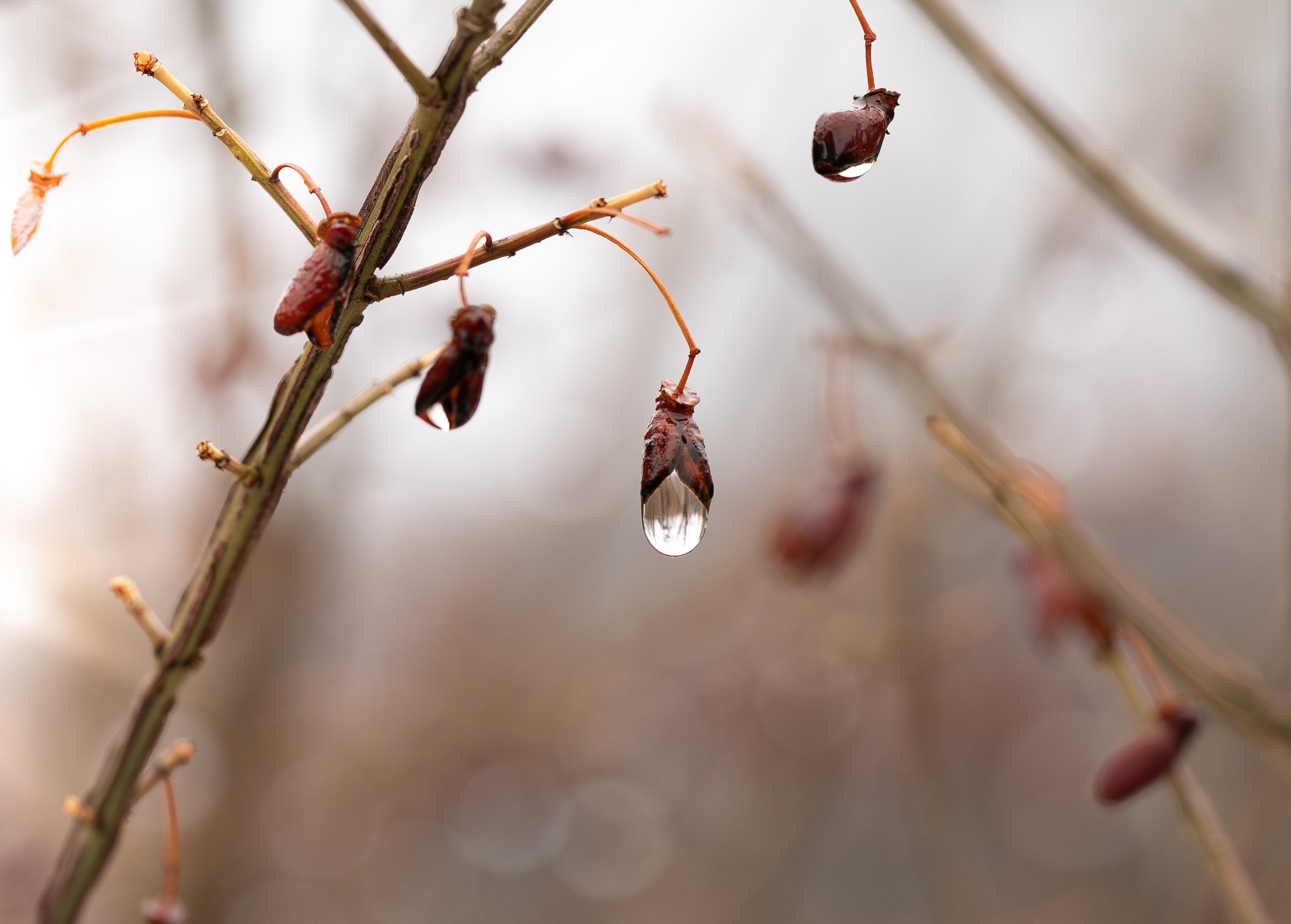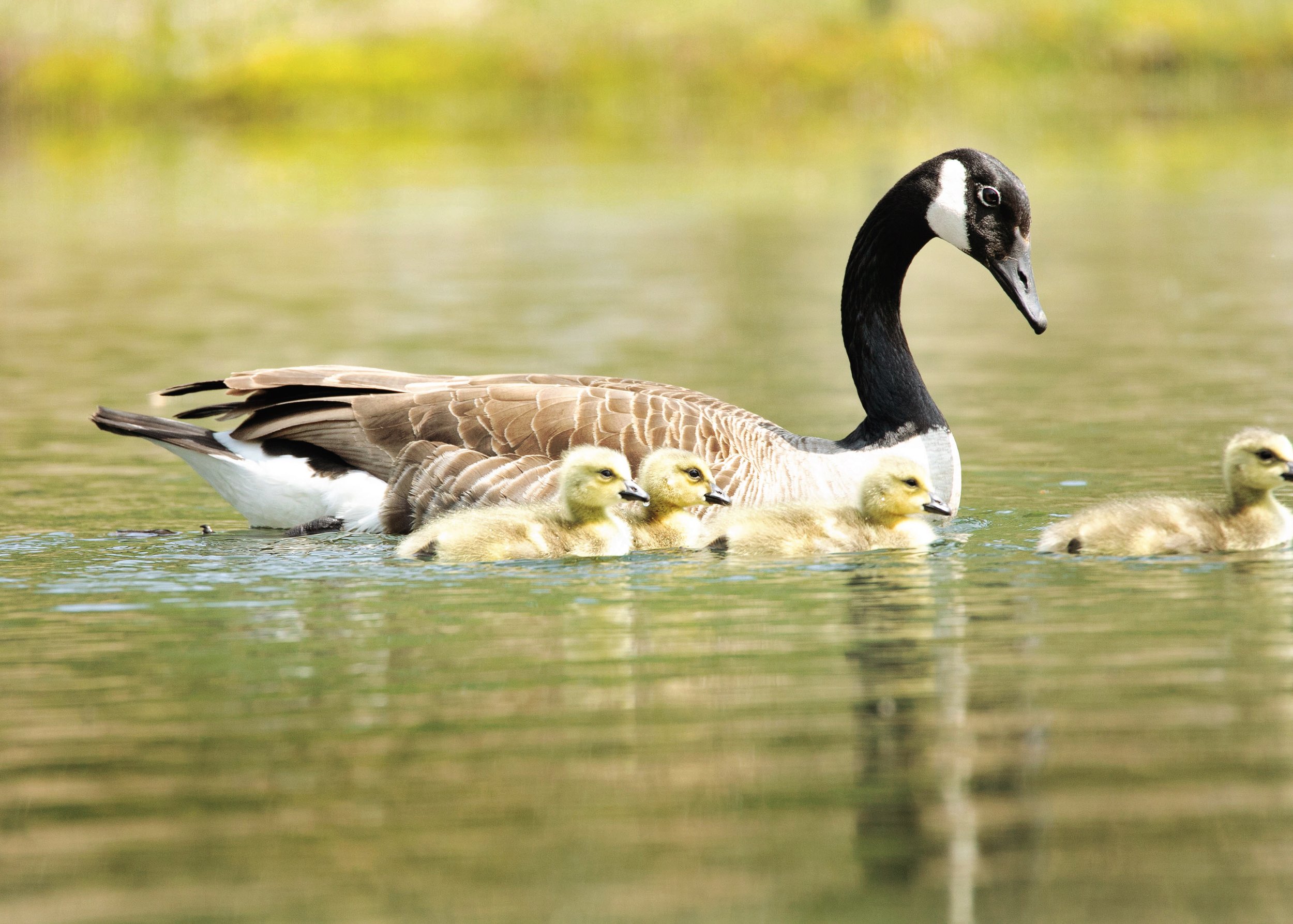Trumpets in the sky.
That’s how spring is proclaimed, long awaited then all at once.
Every year, honking paragliders descend from the clouds of March and drift into the backyard pond. Sometimes there are several pairs, and for the next week or two we’ll watch them charge each other, throats-to-sky, making broad displays of wingspans.
If we’re lucky, they bring the warm weather folded with them underwing. But often they’re a little too early, and they paddle the black strings of water between ice, enduring thick snowfalls.
Eventually, though, the bruise of the earth always surfaces under snow. The pond swells and all melts. After troops of other geese have landed and departed again, after the thawing field has bore witness to their scuffles, one pair usually remains, graceful and victorious.
Our geese, we think. The mates who return year after year to nest on the upper pond with a small tuft of an island, only wide enough for a lonely tree and their nest.
This Spring, I visited mother goose on her nest often. I sat by the clear water and told her this year is your year. I am amazed at Nature’s persistence; to return year after year to the same nest, despite the previous two springs bearing heavy losses of life. Here she was, making herself small on the island moss, trying again. This year is your year, I said.
The goslings in our backyard often hatch on Mother’s day week-end. This May was the same, and like clock-work I woke one morning to find five yellow downy hatchlings wandering the green fields behind mother. Father took up the defensive rear.
But something special happened this year ; our geese tolerated the presence of other non-breeding geese. They kept to one end of the pond and the others to the opposite. Except, as soon as the goslings were born, one of these other geese started following the family around. We called him, or her, the bodyguard. It gave us another reason to say, this is your year, Mother Goose. “You’ve got a body guard now. Your babies will make it.”
Last year, all five of her chicks had disappeared overnight. We blamed the fox but who knows; there are a thousand eyes in the dark and young mouths to feed underground. So for one month, we checked on the family daily. The other lingering geese eventually departed, but the bodyguard stayed. The chicks grew plump and adventurous. They shed their yellow coats for brown fluff. We were hopeful, but we knew that this was usually when the fox strikes. My gut feeling was that this year would be different. This year was going to be their year.
On May 29th, I woke early and filled a pale to water the young apple trees we had just planted. I had grown so used to seeing the goose family every morning for the past month, that it was only when I reached the end of the backyard field and crossed the pond that I realized they were all gone. All but one lonely gosling sitting by himself by the water.
I didn’t understand. They were still too young to fly, so the family couldn’t have taken off anywhere. Yet no predator in our yard would have been able to kill two parents and four chicks in one go. There’d be signs, wouldn’t there? Torn feathers at least. But there was nothing…Only the little guy, clearly a little weary and concerned, sitting in morning sun.
Without the protection of his parents, and the comfort of his brood, I felt so much for this little creature all by itself. My human instincts overpowered rational sense, maybe, and I decided I had to try and catch it before a hawk did, or a fox, or the neighbour’s prowling bengal cat, a feline so big my parents once mistook it for a coyote!
I walked toward the gosling and it let me get close enough, until it stood up and made for the water. I watched it drift and considered my options. That’s when my partner called to me. “There’s another one! Look, there’s another baby!” And surely enough, a second little gosling had emerged from the undergrowth and waddled over to the pond where her sibling swam. She did so confidently, as if it was the decided meeting point for post-emergencies in the goose family.
We decided to wait. We felt the parents were around somewhere. Maybe an attack in the night had spooked them, maybe they’d all gone in different directions. At least one of the pair had to come back. Other goslings were probably still hiding. So we made breakfast and ate outside, keeping an eye on the babies. A pair of broad-winged hawks started circling and swooping threateningly low, perching in nearby branches. But then they were off again.
We blinked when we saw, against all odds, a third little gosling paddling toward the pond from the back reeds. And a fourth was with him! Four babies. Our human hearts falter so easily when we see the fragile prevail in the animal kingdom. But then, they stopped coming. No fifth baby emerged, and still no parents. We spent the entire day by the water, waiting and protecting. But now the sun was setting, and we had a choice to make: either leave them alone in the dark and hope whatever took the others doesn’t come back for them, or try, somehow, to catch them all.
We were deliberating when we saw a female mallard make a noisy descent in the pond. The goslings all started peeping and the one we took to be the leader of the brood stood up expectantly, as if he wondered if they could latch on to this duck. But the mallard flew off again. Then came a wild turkey, out of the woods to drink and take a sand bath in the loose earth by the apple trees. The goslings peeped at her too, but the turkey left.
If it sounds like I am writing a children’s book, believe me I felt it while I watched this all unfold. “Are You My Mother?” came to mind, a book that broke my little kid’s heart back in the day. The dark was coming and the goslings were starting to huddle. I phoned the local wild bird rehabilitation centre. They told me it was unusual for both parents to disappear like that, and the chances of them returning were now, after an entire day, extremely low.
“So what are we going to do,” my partner asked.
“We’re going to get big bed sheets. And we’re going to catch them,” I said.
And that’s what we did. If anyone saw the pair of us they would have thought we were bewitched, running through the backyard fields with bedsheets flapping about us. In the first rescue mission, we each caught a gosling, but the other two ran off into the marshy reeds and we lost them.
We took the two captured ones to the rabbit hutch, which we had just finished setting up for Torts and Hilda. But the rabbits, in times like these, would have to wait.
By the time we looked back toward the pond, the other two were already returning. They waddled right to the place where we had captured their siblings and they sat. Like their mother, they are persistent, trying again despite the risk. Coming back again to the place they were raised, the only place they knew. Where else could they go?
This time, when we approached with our bedsheets at the ready, they didn’t run right away. They flattened themeslves in the short grass as if somehow, they could hide themsleves there. I felt like they were ready to give up, but they shot up at the last moment and darted for the reeds again. We each chased one, threw our sheets, and carefully scooped them up.
We had all four now. I filled a tub of water and placed it in the hutch for them. As soon as I step out of their eyesight, they would swim in there.
My mom and I took to the woods and the garden and pulled as much dandelion as we could. We piled a mound of it in their hutch, thinking it would last a few hours. But they ate it in minutes. And soon the hutch was full of their droppings, and the new turf I had laid, completley unsalvegable. As much as I wanted to keep them until they were strong enough to fend for themselves on the pond, I knew we didn’t have the proper set up to raise 4 wild goslings. We let them rest in the hutch all night, hoping that a small miracle would return the parents to the pond.
Taking them to the wildlife rehabilitation centre was plan B, but before that we had to give plan A a shot. We had read that geese are remarkable parents and will often adopt orphaned goslings. In fact, this is often what rehabilitation centres do when someone brings them a baby goose, they start looking for parents.
So the next day my mom and I drove along Lake of Two Mountains, searching until we found, out in the field in front of an impressionable house, a flock of geese and a group of chicks (we learned that this is what is called a goose creche). We asked the owner of the house if we could attempt an goose rescue and adoption mission on their front lawn. They seemed sceptical, but generous. So we carried the crate of goslings from the back of our car and made our way to the creche.
The adult geese started honking and warning in their usual way, and their own babies retreated to the water with their parents. But this flock could hear, coming from inside our crate, the little peeps of our goslings. You can tell when a goose is listening to something: it stands very still, neck perfectly straight and slightly forward, with only the beady eye searching for the source of the sound. I knew at that moment that these adults would welcome these babies.
I opened the crate door and immediately the four goslings darted out one after the other, peeping for help while the nearby adults honked as if to say “this way!” My mom and I laughed as the goslings, within minutes, were part of the pack, eating grass and foraging in the centre of the flock. We did what we could, and gave them the best second shot they could get. They had multiple bodyguards now.
When we got back home, the pond felt surprisingly empty without them. The backyard rang hollow for a few days after that. I kept thinking of mother goose, whatever had happened to her, and how often I’d told her “This is your year.” I suppose that’s why we fought so hard for her little ones… I felt responsible for them, in a completely self-imposed way.
If it couldn’t be her year, we would try our best to make it theirs.

















